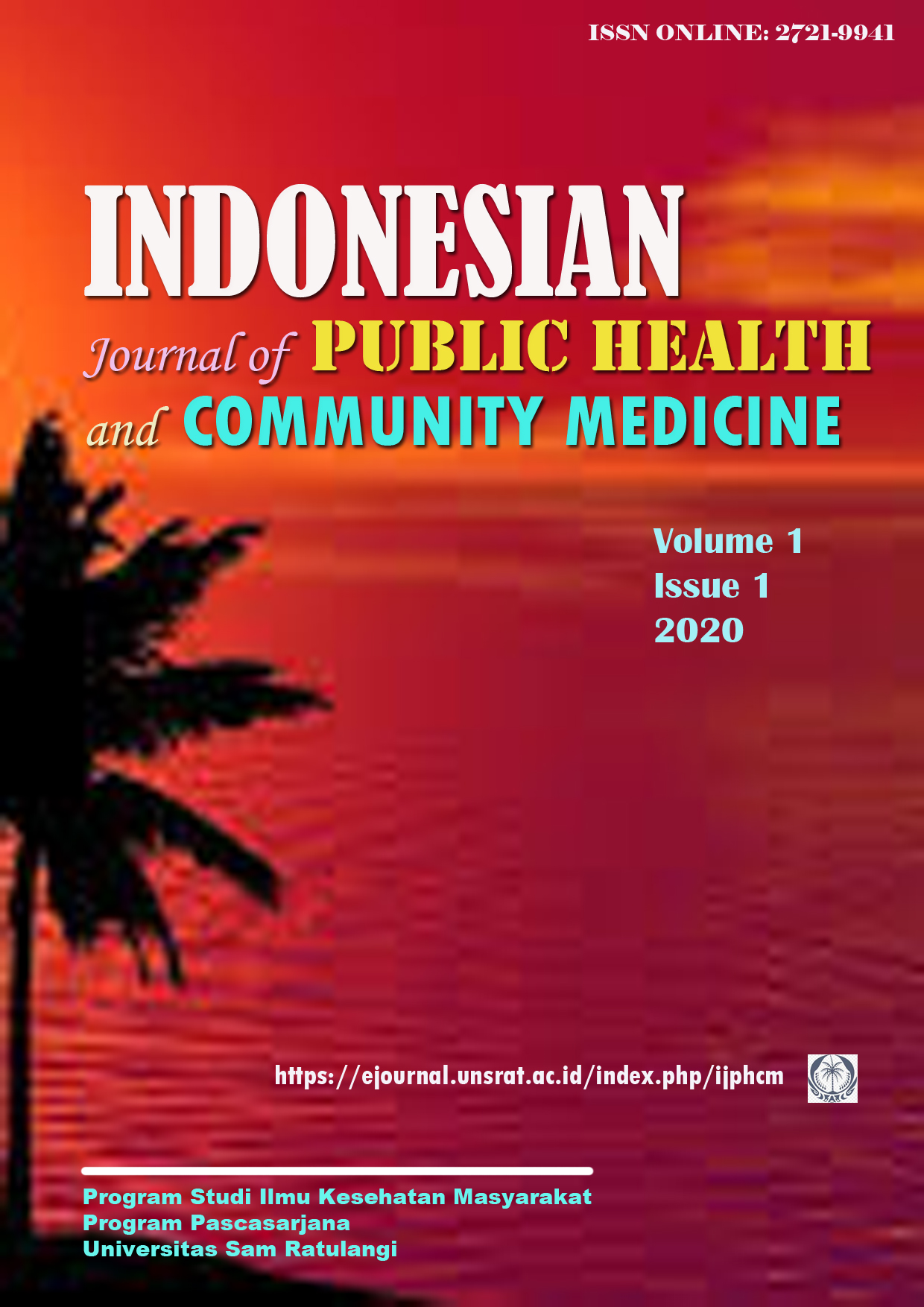Apakah Curah Hujan Berpengaruh terhadap Kejadian Demam Berdarah Dengue?
DOI:
https://doi.org/10.35801/ijphcm.1.1.2020.26641Keywords:
Rainfall, Dengue hemorrhagic fever, TomohonAbstract
Dengue hemorrhagic fever (DHF) is a disease caused by dengue virus transmitted through the bite of the Aedes aegypti mosquito. Environmental factors, such as rainfall, temperature and altitude influence the spread of DHF. This study aims to determine the correlation of rainfall with the incidence of DHF in Tomohon City in 2015-2017. This type of research uses correlational quantitative research using Time Series data. The study population was DHF sufferers who were recoded at the Tomohon City Health Office in 2015-2017. The sample of this reseach is the total population. Data were analyzed using Microsoft Excel and SPSS. Data is displayed in graph and table form. The correlation test results between rainfall and the incidence of DHF in Tomohon City obtained p = 0.019 which means the value of p <0.05. The conclusion of this study is that there is a relation between rainfall and the incidence of DHF in Tomohon City in 2015-2017.References
Butarbutar, R. N., Sumampouw, O. J., & Pinontoan, O. R. (2019). Trend Kejadian Demam Berdarah Dengue Di Kota Manado Tahun 2009-2018. KESMAS, 8(6).
Badan Pusat Statistik Kota Tomohon. 2018. Kota Tomohon Dalam Angka 2018 (online) (diakses https://tomohonkota.bps.go.id/publication/2018/08/16/d8b0e669ae10c0e3bec050d2/kota-tomohon-dalam-angka-2018.html Senin, 21 Oktober 2019 Pkl 17.50)
Dinas Kesehatan Kota Tomohon. 2018. Data Penyakit Demam Berdarah Dengue tahun 2015-2017. Kota Tomohon.
Djati R. A. P, Santoso B & Satoto T. B. T (2012). Hubungan Faktor Iklim Dengan Demam Berdarah Dengue Di Kabupaten Gunung Kidul Tahun 2010. Jurnal Ekologi Kesehatan Vol 11 No. 3
Fadly R, W.P.J Kaunang & A.J Pandelaki. 2015. Pemetaan Kasus Demam Berdarah Dengue di Kabupaten Minahasa Utara. Jurnal Kedokteran Vol III No. 2
Fitriana BR dan Yudhastuti. 2017. Hubungan Faktor Suhu Dengan Kasus Demam Berdarah Dengue Di Kecamatan Sawahan Surabaya. The Indonesian Journal Public Health Vol.13 No. 1
Lahdji A & B. M Putra. 2017. Hubungan Curah Hujan, Suhu, Kelembaban dengan Kasus Demam Berdarah Dengue di Kota Semarang. MEDIKA. Vol 8 (No.1)
Masrizal & N. P Sari. 2015. Analisis Kasus DBD Berdasarkan Unsur Iklim dan Kepadatan Penduduk Melalui Pendekata GIS di Tanah Datar. Jurnal KESMAS Andalas.
Kementerian Kesehatan RI. 2016. Situasi demam berdarah dengue di Indonesia. Jakarta: Pusat Data dan Informasi Kementerian Kesehatan RI
Kementerian Kesehatan RI. 2017. Info Datin Situasi Penyakit Demam Berdarah di Indonesia. Jakarta: Kementerian Kesehatan RI
Pinontoan, O.R. 2018. Pengendalian Vektor. Unsrat Press. Manado
Soedarto. 2012. Demam Berdarah Dengue (Dengue Haemoohagic Fever). Jakarta: CV Sagung Seto
Sumampouw, O. J. (2019). Mikrobiologi Kesehatan. Deepublish.
Sumampouw, O. J. (2019). Perubahan Iklim Dan Kesehatan Masyarakat. Deepublish.
Widoyono. 2008. Penyakit Tropis . Jakarta: Penerbit Erlangga

